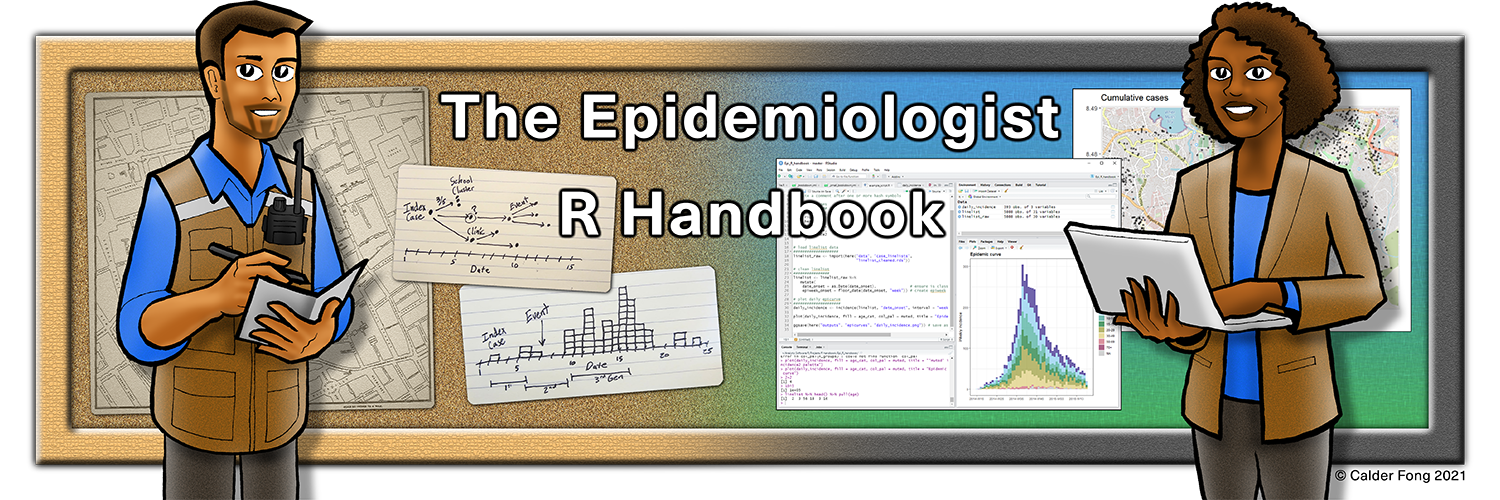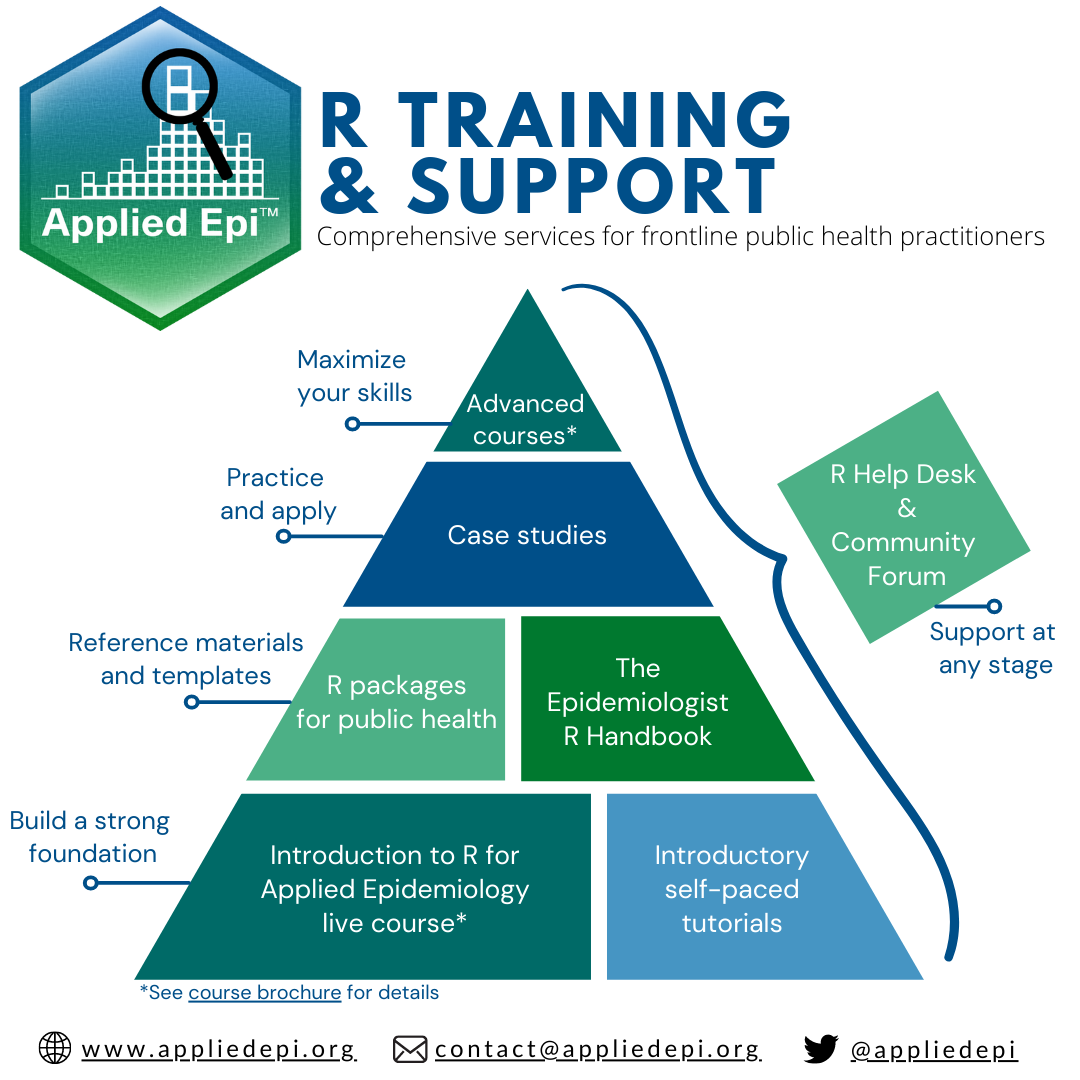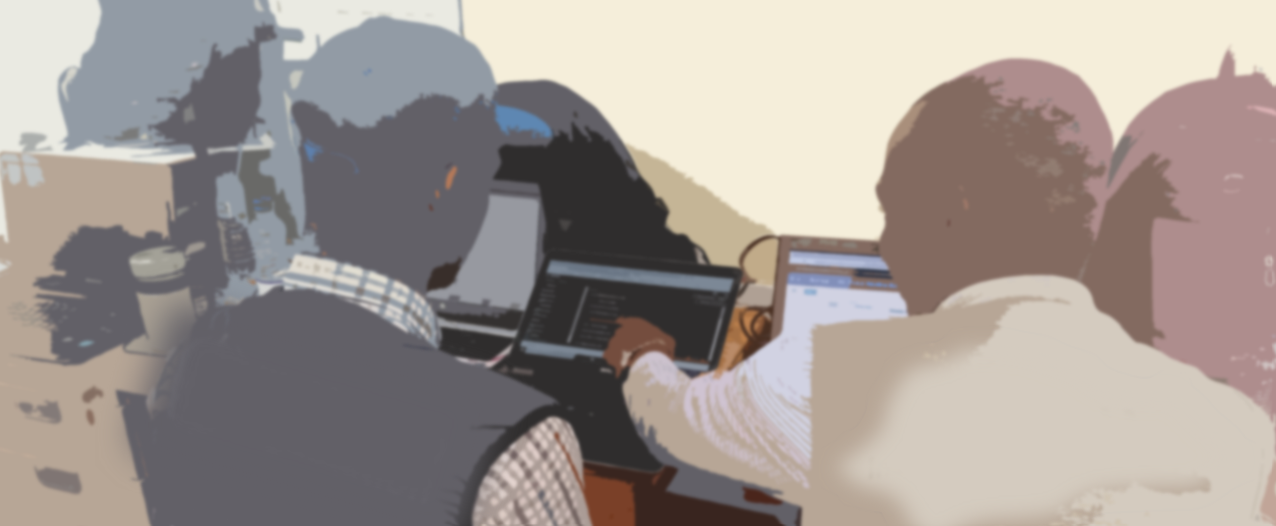The story of Applied Epi
Origin and future
Applied Epi was created by and for frontline epidemiologists
We are ground-level practitioners who have spent decades working in local and district health agencies, fighting outbreaks neighborhood-by-neighborhood, and doing the difficult and messy work of building the health and data systems upon which public health insights depend.
Most actionable epidemiological insight and impact derives from practitioners working at the local level - data managers, epidemiologists, public health practitioners, and clinicians who collect operational data, analyse trends, and communicate findings to guide strategic response to health needs in their local communities.
The story of Applied Epi begins with the Epidemiologist R Handbook
Applied Epi emerged to address an unmet need in applied epidemiology.
In 2020, public health responders all over the world wanted to use R (a free, open-source analytical software) but lacked R training materials relevant to their day-to-day tasks. R’s flexibility, cutting-edge capabilities, brilliant visualizations, and sleek automated reports were proving invaluable in the fast-changing pandemic context.
Building a grassroots movement
In November 2020, an independent group of 50 collaborators convened to create, in their spare time, The Epidemiologist R Handbook. Partners like Médecins Sans Frontières and TEPHINET (a global network of field epidemiology training programs) field-tested and accelerated production of the handbook.

Widespread adoption
Within 24 hours of its launch on May 10, 2021, the Epidemiologist R Handbook had been viewed by 11,000 people, volunteers were offering to translate it, and it was being adopted into curricula at universities, government agencies, and field epidemiology training programs. As of 2023, over 400,000 people had used the Epi R Handbook, with over 3000 views each day.
It was decided to form the non-profit organization Applied Epi to sustain and build upon the Epi R Handbook.
Why Applied Epi encourages use of R
R can transform epidemiology
R is a free, open-source analytical tool used by many disciplines which has existed for over 25 years! We believe that R is an excellent vehicle to transform epidemiology to be more more advanced, efficient, standardized, accessible, and equitable.
The tools utilized by most ground-level practitioners are sub-optimal for today’s demands. Globally, Microsoft Excel and other primarily “point-and-click” tools play a prominent role but are error-prone, result in inefficient and non-reproducible workflows, and offers average users limited analytical flexibility. True analytical freedom comes with software in which the user writes explicit, reproducible code instructions, enabling data transformations and customized outputs. But in many settings, license fees prevent use of such commercial software, like SAS and Stata.
*Note that R does not replace Excel, but instead works alongside it, enhancing and strengthening workflows.
R is cutting-edge and custom-built by users
Because R users learn a programming language, the possibilities for customisation are unlimited. Users can write instructions to combine multiple data sources, execute complex transformations and models, produce automated reports and dashboards, and even build websites (like this one!). Importantly, R is open-source. This means that the millions of R users create and validate new tools at an incredible pace. The rapid development of localized R tools specific for COVID-19 response highlight the advantages of this structure.
R is community-driven and advances equity
As an open-source language, R is built by its millions of users. This creative agency enhances localised use cases and decentralises innovation - ayn R user can create a tool, have it be vetted by the community, and watch it be adopted widely. This empowerment of end-users is paramount to a more equitable epidemiological community.
R is now much easier to learn - there is now a friendly user interface (RStudio) and code syntax (the tidyverse). Vibrant support communities of R users, such as R-Ladies, exist all over the world. As a free software, its adoption enhances emergency response and will result in more competitive epidemiologists from the global south.
Applied Epi’s ecosystem

Applied Epi has constructed a comprehensive ecosystem of R support - with free beginner tutorials, comprehensive synchronous courses, reference materials, advanced courses, R packages, and - most crucially - sustained timely support via our forum and R Help Desk.
Standardized code leads to standardized methods
By implementing a standard analytical language (R), we open the door to standardisation of epidemiological methods. Applied Epi is convening practitioner and academic stakeholders to write our Applied Epidemiology Manual, which will serve as a practical guide to implementation of epidemiological methods.
More accessible and practical epidemiology training
Currently, aspiring epidemiologists face barriers such as high tuition, visa restrictions, limited seats, and curricula that do not address the challenges of frontline practice. Applied Epi is developing educational curricula that are high-quality, comprehensive, and open to aspiring epidemiologists everywhere.
Shape the coming transformation
The shift to programmed epidemiological analytics is coming. Let’s work together to ensure it centers the needs and context of frontline practitioners, is led by grassroots initiatives, and features open-source software that gives power to end-users anywhere.
